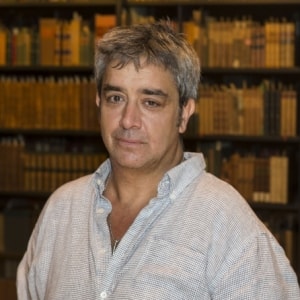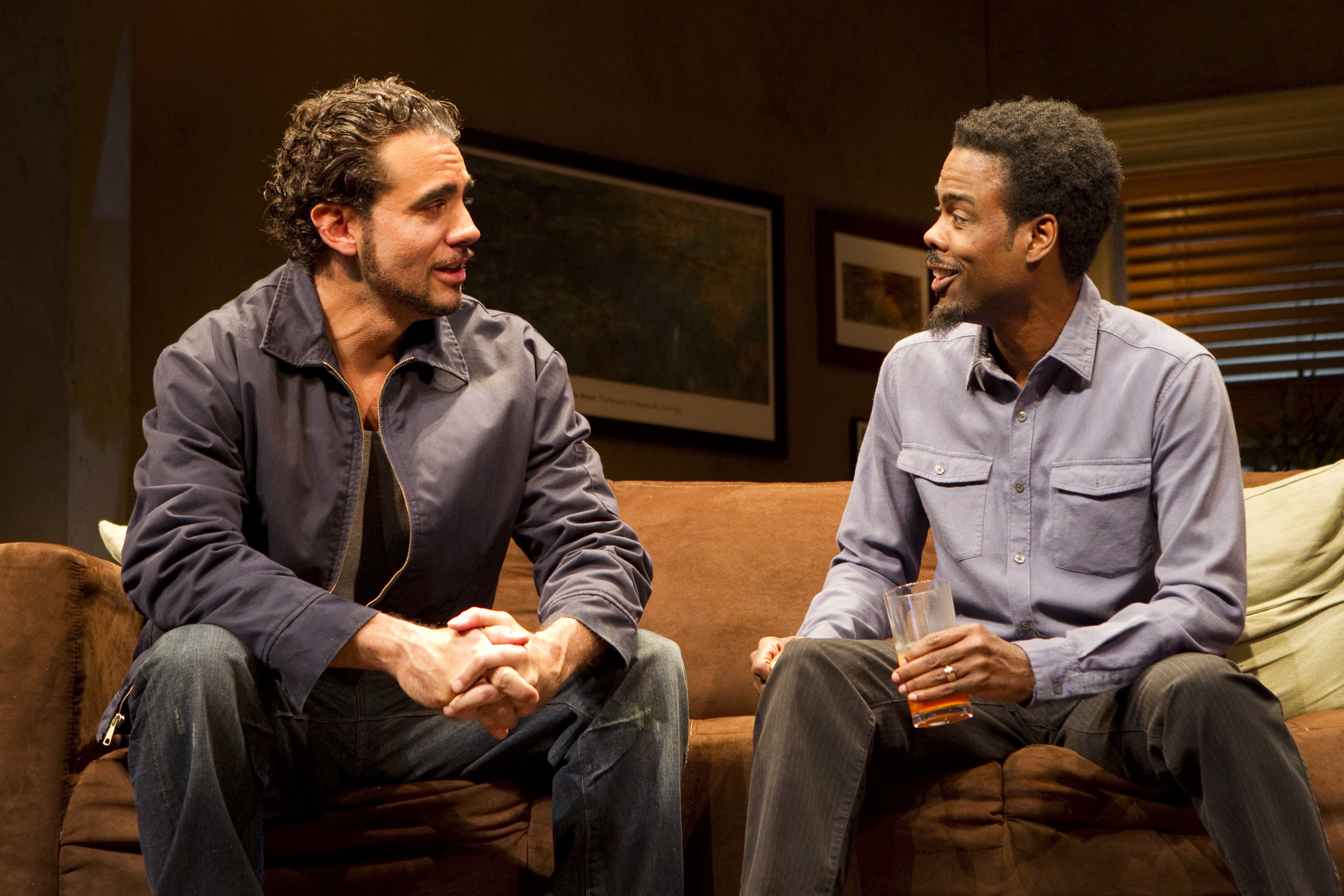
Stephen Adly Guirgis has been up all night. The playwright, known for Jesus Hopped the ‘A’ Train, Our Lady of 121st Street, The Little Flower of East Orange and The Motherfucker With the Hat, is getting used to writing deadlines for television; he’s been burning the midnight oil on pages for a Netflix series he’s working on with Baz Luhrmann about the birth of hip-hop in the 1970s.
He doesn’t have any intention of ditching his work as a playwright, however, and the Harold and Mimi Steinberg Charitable Trust is making sure of that. On Monday night, Guirgis was honored with the Steinberg Distinguished Playwright Award, a.k.a. the Mimi Award, which is the largest prize in the theatre field, with a $200,000 cash stipend attached.
While the money will keep him writing and allow him the ever-elusive flexibility to do so, he’s still focused on his community: Both the friends he often houses at his Upper West Side apartment, the same one he grew up in, and his artistic collaborators. He also remains dedicated to theatricalizing underrepresented communities onstage.
“At the end of the day, my hope and expectation when I go to the theatre or I’m creating theatre is that I’m going to see myself in the characters, that they’re going to be relatable,” Guirgis said in a recent interview. “I think to some degree, anything that’s relatable becomes more human.”
American Theatre sat down with Guirgis on the occasion of the Steinberg Awards to talk about this career and what’s next.
Congratulations on the Steinberg Award. When did you find out that you’d won?
They told me about it in late May or June, and they were like, “You can’t tell anyone until we announce in September.” At the time, I was still writing Between Riverside and Crazy, and I remember, when they told me about the award, I thought, “Fuck, this play better be good.” Imagine you write a play and it [receives] pans, and you make them they look like idiots. It helped me try to avoid shame.
And now the play’s coming back to Second Stage in January.
Yeah. We’re going into rehearsals right after Christmas, and we’re going to start previews actually on my birthday, Jan. 15.
Are you working on any new plays?
I have this new play that’s in progress, and right now it’s just called Untitled Boxing Play. I have that to finish. I’m doing revisions of Riverside for Second Stage. Then there’s another play that’s gestating. I could very easily and very happily write plays for a while.
When did you decide you wanted to be a playwright?
I’m not sure that I’m there yet even. I started as an actor, and I’m still an actor. It’s still what makes me most happy. But when I came into Labyrinth, we were encouraged to be multidisciplinary, and someone asked me to write a little one-act. I wrote it, and we put it up and everybody laughed when it was funny and got quiet when it was serious and applauded a lot at the end. Then all my friends were like, you’ve got to keep writing. So initially, playwriting was just a method of creating work for me and my friends, and ever since, I’ve been growing into the actual relationship with what it means to be a writer. It may be what I’m meant to do, but I’ve found my way there more than thinking, I want to write.
Were there any playwrights who inspired you as you were starting out?
In high school, I liked Tennessee Williams a lot. I guess, who doesn’t? But that became a subconscious model for emotional content. At a certain point, I read [John Patrick] Shanley’s Danny and the Deep Blue Sea and that was a kind of liberating. Oh, you can just write? It’s okay to just write like that. And then there’s a writer, Seth Rosenfeld, and I saw a reading of one of his plays, and it was like—Shanley is the Bronx, Seth was Harlem and my neighborhood (Upper West Side), and I was like, Wow. But more I was guided by my experience and training as an actor and also by my experience as an audience member. I would like to write what I would like to see on the stage.

Do you write for the actors you know?
Yeah often. There’s a core group—John Ortiz, David Zayas, Ron Cephas Jones and Liza Colon-Zayas. I would write for them often. I would say that my plays, when you break down the characters, a third of them are written for someone in mind.
When you’re writing with someone in mind, do you invite them into your writing process?
I write them into the process by having readings a lot. If you’re working with good actors and you write something and it doesn’t make sense coming out of their mouth, 90 percent of the time, it’s your fault, not their fault. Also, I’m not like a big go-getter. So if I say to myself, “Oh, I’ve got to write this play, now it’s mid-November, how long does it take to write a play? Maybe three months? So Valentine’s Day.” Valentine’s Day will come and go, and I won’t write anything. But if I have an idea for something and then I get on the phone and I call you and I say, “Are you free the Monday after Thanksgiving? Can you act in this thing?” I call five or six people, and now all of a sudden there’s this event happening called a reading, and I have to write something. Because when I call you, I don’t have any pages at all most of the time. But now I have these people showing up at my house, and now, I got to write.
How long does it take you write a first draft?
It really varies. My plays probably largely gestate inside until they’re ready to come out. Usually, I write a bunch, I don’t write at all, and then I take it out and write some more. Oftentimes what you’ll read on the page and see on the stage may have been written fairly quickly, but the process of conceiving it or putting it together could span over a year or two years.
Where do you get your inspiration for your plays? Are they based on personal experience?
Anything that’s any good—whether it’s a play or a movie or a performance or a dance—it’s going to be contained by a lot of autobiography, and it’s just that some pieces employ more metaphor and some pieces can be seen more literally. I wrote a play a few years ago called The Little Flower of East Orange, and it dealt with family. And people saw that play as being overtly autobiographical. And it was interesting because it was, but it wasn’t. I don’t think it was any more autobiographical than anything else I’ve written—just like the employment of metaphor. So if I write a play that takes place in a prison with a serial killer and a bike messenger, which I did years ago [Jesus Hopped the ‘A’ Train], nobody is going to write or say, “Oh, it’s about his blah blah blah.” But it’s coming from here.
How do you come up with your titles?
Usually I start with really bad generic titles like Untitled Boxing Play. For Jesus Hopped the ‘A’ Train, the working title—it’s so generic I can’t even remember it—wait, it was A Question of Faith. Oftentimes, the title will come out of dialogue. Someone will say something, and I’ll be like, “That’s what this play’s about, and I’ll put it in.” And I try to just make the title evocative of something. Maybe it’s because I’m never fully confident in what I’m doing. If you know you’ve written a masterpiece, then you can call it The White Dove, and it doesn’t matter. But if you’re kind of unsure, then you can call it, White Dove Shits in Morning Traffic. If you fucking write brilliant, you can call it The Teapot. And then they’ll write endlessly, “Yes, it is true, the metaphor of the teapot…”
Your plays are done all over the country and even internationally. What do you want theatres that do your plays to know?
The only thing that I really want or care about is this idea of, I somehow write a play at my kitchen table, and then later people I’ve never met get together in places I’ve never been and have hopefully a good experience together communally, based off the fact that I wrote something at my kitchen table. That gets me going. I’m just happy they’re doing the plays. I remember when I did Our Lady of 121st Street in Chicago, one guy was like, “In Chicago, there’s a lot of theatre, and so there’s a lot of opportunities. But largely there’s white theatre and there’s a black theatre and a Latin theatre, and they’re all thriving. But you wrote a play that forces those three things to come together so we get an experience that we don’t normally get.” What else is there? A play is not a cure for cancer. The best play in the world is not going to make peace. But it’s going to create a community to perform it, and it’s going to be performed for a community, and when those communities are spicy, when there’s different ingredients in the pot, that to me is the most beautiful thing.


